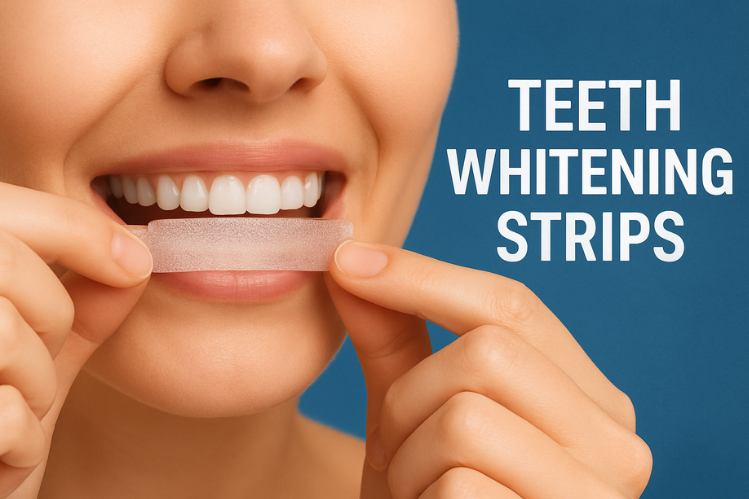
Table of Contents
- What Are Teeth Whitening Strips?
- How Do Teeth Whitening Strips Work?
- Do White Strips Work on Everyone?
- How Do 3D White Strips Work?
- Do Teeth Whitening Strips Work Long-Term?
- Pros of Teeth Whitening Strips
- Cons of Teeth Whitening Strips
- Tips for a Bright Smile
- Are Teeth Whitening Strips Safe?
- Teeth Whitening Strips vs. Professional Whitening
- Do Whitening Strips Work?
- FAQs
In today's society, where dental hygiene is often neglected, a white smile is desirable because it represents not only health and beauty but also confidence. There are many teeth whitening treatment options available to consumers in today's market, including treatments completed in a dentist's office, at-home do-it-yourself teeth whitening kits, and products purchased at the corner pharmacy, such as teeth whitening strips. Teeth whitening strips are a consumer favorite due to their affordability, ease of use, and availability at multiple pharmacy locations or online. While teeth whitening strips are popular, the question is whether they are effective. In this blog, let us discover what teeth whitening strips are and find out if they work.
What Are Teeth Whitening Strips?
Teeth whitening strips are a modern yet effective approach to teeth whitening. They are composed of thin, flexible plastic that is coated with a teeth whitening gel consisting of peroxide-based compounds. It usually includes hydrogen peroxide or carbamide peroxide. The active ingredients found in whitening strips are those used in professional whitening treatments, but with a lower concentration.
The whitening strips adhere to the surface of your teeth, holding the whitening gel in place and allowing the whitening agent to sit on your teeth for a certain period of time (20-60 minutes is most common). Over time, they will gradually break down stains in the enamel and dentin layers of your teeth. If you do not want to step out of your house and get your teeth whitened, at-home whitening kits can be an option as well.
How Do Teeth Whitening Strips Work?
When placed on the teeth and worn for the suggested amount of time, the peroxide gel in the strips breaks down into hydrogen and oxygen molecules, which penetrate the enamel and break apart the stain-causing chemical bonds. This process is called oxidation and basically lifts away the discoloration. It's a gradual process. For instance, after a few applications, the user may begin to see some improvement. While after completing the full course of whitening strips (generally 10–14 days), most people see a noticeably whiter shade of teeth. This technique will work on extrinsic stains (stains that are on the enamel of teeth, such as coffee, tea, soda, red wine, and smoking).
Do White Strips Work on Everyone?

Teeth whitening strips are an effective solution to brighten your smile. However, they surely come along with limitations. They can noticeably whiten teeth, but they won’t deliver the dramatic results of professional dental treatments. Teeth whitening strips can help with mild to moderate discoloration; they usually help to lighten one to two shades. However, the results vary depending on the following factors:
Stain Severity
If your teeth are severely stained from smoking or tetracycline medications, or due to genetics, whitening strips may not work effectively.
Lifestyle Habits
Individuals with the habit of drinking coffee, tea, red wine, and especially smokers, will experience slower results.
Dental Work
If you have dental restorations like crowns, veneers, or fillings, the strips won’t change their color, leading to uneven whitening.
Consistency of Use
Consistency is the key; if you do not follow the guidelines and duration for application, chances are that you may not get the desired results.
Tooth Sensitivity
If you have tooth sensitivity, you may find that you need to use the strips once per week instead of once per day.
So, whitening strips will work best as a surface whitening for those who want gradual, inexpensive results without the dentist.
How Do 3D White Strips Work?
Crest 3D White Strips are among the most well-known whitening strip brands. But how do 3D White Strips work?
They use the same peroxide-based whitening agents but are designed with Advanced Seal Technology that helps the strips stick more securely to your teeth. Unlike older whitening strips that slipped or felt uncomfortable, these mold better to your teeth’s shape, allowing the gel to stay in place longer and provide more even results. Users often report noticeable results in just a few days, with full results in about two weeks.
Do Teeth Whitening Strips Work Long-Term?
While strips do whiten your teeth, the results are not permanent. Over time, exposure to food, drinks, and lifestyle habits will cause new stains. Typically, results last between 6 months to a year, depending on your oral hygiene and diet. Many people repeat treatments every 6–12 months to maintain their results. For longer-lasting whitening, professional treatments or custom take-home trays from a dentist may be necessary.
Pros of Teeth Whitening Strips
Much Cheaper than Dentist Treatments
One of the biggest advantages of whitening strips is the price. A professional whitening session at the dentist can cost anywhere from $300 to $1000, depending on where you live. In comparison, whitening strips usually range from $20 to $50. This makes them a practical and budget-friendly option for people who want a brighter smile without spending a fortune.
Easy and Convenient to Use at Home
You don’t need special tools, dentist supervision, or complicated steps. Each strip comes with a pre-applied whitening gel—simply peel it off, place it on your teeth, and wait. You can even multitask while wearing them, such as reading, cooking, or relaxing, which makes them very user-friendly.
Works Well on Surface-Level Stains
When used regularly, whitening strips can brighten teeth by one or two shades, or even more. They’re especially effective for stains caused by coffee, tea, wine, or smoking. While they may not remove very deep discoloration, they’re great for lifting everyday stains and keeping your smile fresh.
Widely Available without a Prescription
You don’t need a dentist to buy them. Whitening strips are sold at most pharmacies, supermarkets, and online stores, which makes them easily accessible. This convenience is one of the main reasons they’re so popular.
Discreet and Comfortable
Modern strips are designed to be slim, clear, and flexible. They stick closely to your teeth without being bulky, so you can wear them without people noticing. Unlike trays or messy gels, they’re less awkward and much easier to manage.
Cons of Teeth Whitening Strips
Results are Temporary
The whitening effect usually lasts between 6 months to a year, depending on your habits. If you drink coffee, tea, or red wine regularly, your teeth may stain faster. This means you’ll need repeat treatments to maintain results.
Whitening Can Be Uneven
Because strips are flat, they don’t always fit perfectly around the curves and edges of your teeth. This can leave some areas, especially between teeth or near the gums, looking darker compared to the front surfaces.
Can Cause Tooth Sensitivity and Gum Irritation
A common issue is sensitivity to hot or cold foods and drinks after using strips. If the gel touches your gums, it may also cause mild irritation or a burning feeling. Although these effects are usually temporary, they can be uncomfortable.
Not Effective for All Types of Stains
Whitening strips mainly work on surface stains (from food, drinks, or smoking). They are less effective for intrinsic stains, which are deeper discolorations caused by aging, genetics, or certain medications. They also don’t whiten dental restorations like fillings, crowns, or veneers, which may result in uneven coloring if you have dental work.
Risk of Overuse
Because strips are easy to buy and use, some people are tempted to apply them more often than recommended. Overusing them can damage tooth enamel, increase sensitivity, and even make teeth more prone to staining in the future. Always follow the instructions carefully to protect your teeth.
Tips for a Bright Smile

If you’re considering using whitening strips, here are some tips to maximize effectiveness:
- Brush and floss before application to remove plaque and food particles.
- Avoid eating or drinking (except water) for at least 30 minutes after use.
- Stick to the schedule: don’t skip applications if you want consistent results.
- Limit stain-causing foods and drinks (coffee, tea, wine, soda).
- Don’t overuse strips: excessive use can damage enamel and cause sensitivity.
- Pair with whitening toothpaste for maintenance.
Are Teeth Whitening Strips Safe?
When used as directed, whitening strips are generally safe. The main risks include:
- Tooth sensitivity: Often temporary and subsides after stopping use.
- Gum irritation: If the strips touch your gums too often.
- Overuse damage: Using strips excessively may erode enamel.
To avoid risks, always follow the manufacturer’s instructions and avoid using strips more often than recommended.
Teeth Whitening Strips vs. Professional Whitening
Strips are a great budget-friendly entry point, while professional treatments offer faster, longer-lasting results.
| Feature | Whitening Strips | Professional Whitening |
|---|---|---|
| Cost | $20–$50 per box | $300–$1000 |
| Effectiveness | 1–2 shades lighter | 5 - 8 shades lighter |
| Time | Daily use for 1–2 weeks | 1–2 visits |
| Longevity | 6 months–1 year | 1–3 years |
| Safety | Over-the-counter strength | Supervised by a professional |
Other alternatives to whitening strips include at-home whitening kits, whitening pens, and whitening toothpastes.
Read more about whitening pens and toothpastes here:
Best Rated Teeth Whitening Toothpastes You Can Buy Online
How to Use a Teeth Whitening Pen Without Damaging Enamel
Do Whitening Strips Work?
There are different options to get your teeth whitened, including professional whitening, at-home teeth whitening kits , and over-the-counter options like whitening strips. If you are wondering whether whitening strips provide effective results, yes, they do. They are a great, cheap, and easy way to get a brighter smile without stepping into an office.
They will not replace professional whitening, but they are great for someone who wants to see improvements in their smile, without spending hundreds on a product or service. This is not a professional service, so you cannot expect professional results. You need to be consistent and follow the directions on the package. Do not use them excessively to protect your enamel. If you follow the directions, whitening strips can provide a healthy added boost of brightness and confidence to your smile.
FAQs
1. Are teeth whitening strips actually effective?
Yes. Whitening strips are effective for mild to moderate surface stains. They can lighten teeth by 1–2 shades and are especially effective for coffee, tea, and wine stains. However, they won’t work as well on deep stains or restorations like crowns or veneers.
2. How long does it take for teeth whitening strips to work?
Most people see results within 3–5 days, with full results after 10–14 days of consistent use. Some premium brands may show results faster.
3. Do Crest Whitestrips really whiten your teeth?
Yes. Crest Whitestrips are among the most effective over-the-counter whitening strips because they use the same peroxide ingredients as professional whitening but in lower concentrations. They are FDA-approved and dentist-recommended for safe at-home whitening.
4. Do Crest White Strips work for really yellow teeth?
They can improve the appearance of yellow teeth but may not completely whiten them if the discoloration is severe or caused by underlying issues. For deeply yellow or grayish teeth, a dentist-supervised whitening or alternative treatment may be more effective.
Citations:
Cpt, S. C. (2021, July 21). What to know about teeth whitening strips. https://www.medicalnewstoday.com/articles/whitening-strips
Clinic, C. (2024, July 11). Brighten your smile: How to get Whiter teeth. Cleveland Clinic. https://health.clevelandclinic.org/how-to-whiten-teeth
Clinic, C. (2024b, July 15). Are teeth whiteners safe and worth trying? Cleveland Clinic. https://health.clevelandclinic.org/is-teeth-whitening-safe





